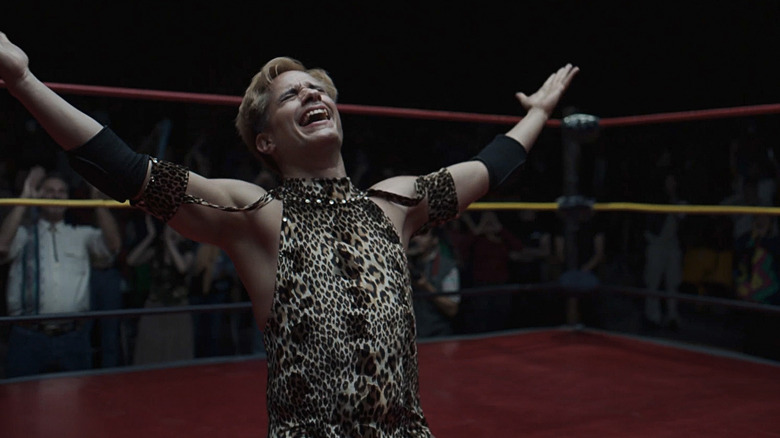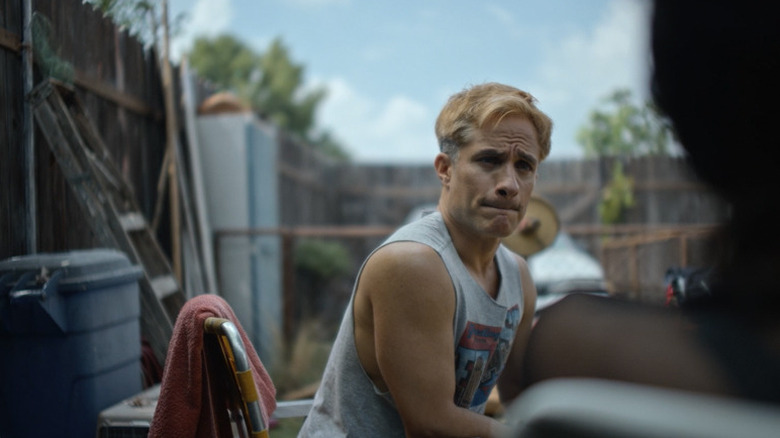Cassandro Review: Gael García Bernal Flies High In This Luchador Biopic [Sundance]
In 2016, documentarian Roger Ross Williams ("Life, Animated") made a short film about Saúl Armendáriz, an American-born, openly gay wrestler known as Cassandro, who was nicknamed the "Liberace of Lucha Libre." Seven years later, Williams explores the same subject in his first scripted feature "Cassandro," this time with "Y tu mamá también" and "Werewolf By Night" actor Gael García Bernal in the lead role. The result is a steadily entertaining character piece, full of impressive lucha libre sequences and anchored by a strong lead performance from García Bernal.
As the movie opens, Saúl prepares to wrestle in a makeshift ring in an auto parts shop in Juárez, Mexico. His Lucha Libre character is El Topo, a boring henchman who gets pummeled by Gigántico, the brutish local favorite. Saúl likes his work but yearns for better storylines and more exciting matches. Gigántico, he says, has "no poetry," no sense of showmanship. He wants to take control of his own narrative, so he tracks down and impresses a nearby female pro named Sabrina (Roberta Colindrez), who offers to train him and suggests he create a new character who fits into the "exótico" archetype — feminine, queer-coded characters who are flamboyant and flashy in the ring. Saúl is hesitant because tradition dictates that exóticos always lose, but after watching a cheesy soap opera called "Kassandra," he embraces the idea and, adorned in his supportive mother's clothes, concocts a new in-ring personality, "Cassandro." But Saúl isn't content with losing. He has big dreams. One day, he might even be able to buy his mom a new house, or maybe, just maybe, earn the respect of the father who abandoned him after Saúl came out as a teenager.
The movie is at its best during the Lucha Libre scenes
At the very least, Cassandro is quickly able to earn the respect of the crowds, who transition from hurling slurs at him to chanting his name after they see him in action for a few minutes. As an openly gay wrestler who refuses to succumb to the typical formula, he blazes a trail and earns the adulation of hordes of fans, which he drinks in thirstily. Somehow, validation feels good in a place like this. As Cassandro becomes more of a success, we learn more about Saúl's fraught relationship with his father, his complicated relationship with his mother, and get a peek into Saúl's ill-fated affair with a fellow Lucha Libre wrestler who's married to a woman.
García Bernal does almost all of his own stunts here (unless the budget is much higher than it appears and tons of money went into hyper-convincing face replacement), spinning and flipping and leaping and kicking and slamming and falling, and Ross Williams shoots all of the wrestling scenes with the appropriate amount of energy and verve. The movie is at its best when Cassandro is in the ring, turning the tides of the jeering and cheering crowds, but thanks to Marcelo Zarvos' excellent and smartly employed score, full of forlorn horns, the quieter moments also resonate.
There are a few aspects of the script that seem to be setups for payoffs that never quite come (Saúl's drug use with a character played by Bad Bunny appears to be a big deal, but there's no real reckoning or even self-awareness about it), and I was left unsatisfied by a couple of subplots that I felt could have used more attention. But ultimately, "Cassandro" is a solid drama that provides another strong showcase for Gael García Bernal's many talents, and marks a largely successful transition into scripted storytelling for Roger Ross Williams.
/Film Rating: 7 out of 10

